|
|
|
Sort Order |
|
|
|
Items / Page
|
|
|
|
|
|
|
| Srl | Item |
| 1 |
ID:
185263
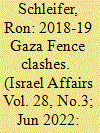

|
|
|
|
|
| Summary/Abstract |
This article examines the violent clashes between Hamas and Israel along the Gaza Fence (30 March 2018–27 December 2019) from a psychological operations (PSYOP) perspective. It shows how Hamas managed, through a skilful combination of mass riots, media manipulation, and quick adaptation to changing circumstances to subvert the strategic priorities of the Israel Defence Forces (IDF), wear down Israeli morale, and erode Israel’s sovereignty in its southern region – all this while deterring Israel from launching a large-scale military operation in Gaza. As such, the Gaza Fence clashes provide an example of a PSYOP-based strategy that can be applied to other border conflict zones, such as Morocco, Saudi Arabia, Mexico, and Islamist insurrections.
|
|
|
|
|
|
|
|
|
|
|
|
|
|
|
|
| 2 |
ID:
181755
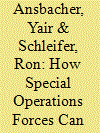

|
|
|
|
|
| Summary/Abstract |
The commission of inquiry into the events of military engagement in Lebanon in 2006 asserted that Israeli special forces were improperly deployed during the Second Lebanon War. In this article, Yair Ansbacher and Ron Schleifer explore why the Israeli special operations forces’ (SOF) contribution to campaigns have been marginal, using the 2003 US deployment of SOF in Iraq as a point of comparison. They aim to identify and define the most effective deployment modes of modern SOF in war, and explain the changes that Israeli SOF must undergo to enhance future performance.
|
|
|
|
|
|
|
|
|
|
|
|
|
|
|
|
| 3 |
ID:
182891
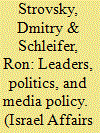

|
|
|
|
|
| Summary/Abstract |
The Russian media frequently wrote about Israeli Prime Minister Benjamin Netanyahu (1996–99, 2009–21), analysing his role in Middle Eastern affairs, especially with regard to Palestinian-Israeli relations, the Syrian civil war, and the Iranian nuclear programme. Examining Netanyahu’s image in the Russian press is crucial not only for understanding the political priorities of twenty-first-century Russian media but also for investigating Moscow’s role in international politics given its keen interest in the Middle East.
|
|
|
|
|
|
|
|
|
|
|
|
|
|
|
|
| 4 |
ID:
143626
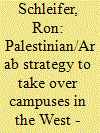

|
|
|
|
|
| Summary/Abstract |
The article examines the Palestinian/Arab two-step strategy in taking over the Middle East discourse on Western (mainly American and British) campuses in the past five decades. During this period, the main theme became “the occupied Palestinian territories” or “The Occupation.” The real objective, though, was and is the de-legitimization of the idea of Jewish statehood. The methodology is based on 150 interviews with Jewish activists who studied or worked on campuses in Europe and the United States during the last thirty-five years. After presenting a chronological survey and then analyzing the strategy’s operational techniques – goals, messages and techniques – the article suggests counter-responses for Israel and presents an outline for further research.
|
|
|
|
|
|
|
|
|
|
|
|
|
|
|
|
| 5 |
ID:
068333
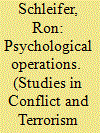

|
|
|
| 6 |
ID:
075905
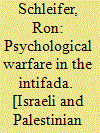

|
|
|
|
|
| Publication |
Portland, Sussex Academic Press, 2006.
|
| Description |
viii, 241p.pbk
|
| Standard Number |
1845191358
|
|
|
|
|
|
|
|
|
|
|
|
Copies: C:1/I:0,R:0,Q:0
Circulation
| Accession# | Call# | Current Location | Status | Policy | Location |
| 052116 | 956.94054/SCH 052116 | Main | On Shelf | General | |
|
|
|
|
| 7 |
ID:
087763
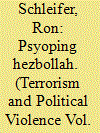

|
|
|
|
|
| Publication |
2009.
|
| Summary/Abstract |
The 2006 War between Israel and Hezbollah had a significant component of PSYOP. For the first time in its military history Israel deployed PSYOP as an inseparable part of its military operations. The performance of the PSYOP unit was less than satisfactory due to organizational factors and the general conduct of the war itself. This article analyzes the goals, the themes, and the delivery channels used throughout the PSYOP campaign. An attempt is made to answer the key question of whether this effort was effective.
|
|
|
|
|
|
|
|
|
|
|
|
|
|
|
|
| 8 |
ID:
171186
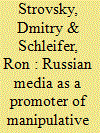

|
|
|
|
|
| Summary/Abstract |
The content of mass information in any society is closely linked to the patterns of its political development. A typical example of this concerns the modern Russian media, which have been influenced particularly by their embeddedness with the authorities. Indeed, the Russian media have served as the mouthpiece of the country’s political leaders, and this fact has left a significant imprint on media coverage. To understand the symbiotic relationship between Russian political leaders and media, this article focuses on the Syrian Civil War, which is currently one of the most important issues on the international political agenda. The Russian government’s role in the conflict over the last several years has affected the Russian media’s tremendous interest in this topic. Nonetheless, Moscow’s participation in the war was determined uniquely by how the communication sphere related the conflict to its audience so that its involvement in the Syrian imbroglio was not an objective reflection of reality. Guided by the political interests of the authorities, the Russian media created an emotionally oriented story, which intended to advance an extremely positive interpretation of Russia’s role in this conflict in the minds of the audience. Therefore, in terms of propaganda, these media acted not as “pure” promoters of the state’s will, but rather as its “interpreters.” This study highlights how leading Russian publications approach this agenda and the consequences this fact has for the Kremlin’s political priorities. The authors come to a definite conclusion regarding Russian media’s unconditional dependence on the political priorities of modern Russian society. It was crucial for the Kremlin that the media present a positive view of Moscow’s involvement in the conflict given that Russia’s military presence in Syria caused a very controversial reaction throughout the world and led to increased tensions and contentious disputation between Russia and many Western countries. Therefore, the Kremlin needed to justify its policies and did so through manipulating the Russian public by means of a large-scale propaganda campaign conducted through the Russian media. This phenomenon is pivotal to understand not only the case of Russia’s involvement in Syria but also contemporary international media development.
|
|
|
|
|
|
|
|
|
|
|
|
|
|
|
|
| 9 |
ID:
188343
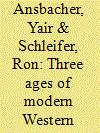

|
|
|
|
|
| Summary/Abstract |
Troops with special skills have typically played strategic and tactical roles as valuable components of conventional military organizations. The start of World War II marked a change, wherein special forces (SF, as they were referred to in Britain, and special operational forces [SOF] in the United States) were separated and played roles distinct from conventional military forces. Recently, Finlan (2019) advanced the notion that since the start of World War II, three unique, punctuated ages of SOF have existed, reflecting various political-military needs and realities. First-age SOF were largely restricted to operations behind enemy lines, aiding the conventional forces. Second-age SOF fought in proxy wars, with and against guerrilla forces, and engaged in aiding political ends when nuclear realities rendered direct military confrontations between world powers too risky to contemplate. The advent of extremist ideology-related terrorism initiated a rethinking of the role of SOF and their initial mobilization to combat this growing threat. Third-age SOF became invaluable in the global fight against terrorism. This paper advances this theory by further delineating differences between the three ages and providing in-depth evidence supporting the soundness of the construct.
|
|
|
|
|
|
|
|
|
|
|
|
|
|
|
|
| 10 |
ID:
158147


|
|
|
|
|
| Summary/Abstract |
This article explores the use of sport in the formation of an Israeli cultural (multi-ethnic) identity and its historical and contemporary place in the Palestinian–Israeli conflict. The power of sporting events lies in the fact that the teams represent for their fans an ideology beyond the game itself. Supporting a sports team is a primary form of identity for many people. Highly salient sporting events, which are supercharged with emotion and garner eager interest, are also a venue for achieving political objectives on the local, national, and international levels.
|
|
|
|
|
|
|
|
|
|
|
|
|
|
|
|
| 11 |
ID:
123052
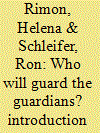

|
|
|
|
|
| Publication |
2013.
|
| Summary/Abstract |
The present special issue aims to raise questions about intellectuals, those members of society who are typically expected to engage in fruitful questioning of social mores.
A key contribution of 18th-century Enlightenment thought to modern culture was the special status associated with a university degree. The mode of thinking which corresponds to this development is still prevalent today. A university alumna holding a degree in the humanities-and, historically beginning at a somewhat later date, also one holding a degree in the social sciences-automatically achieves the halo of a gatekeeper in our society. Yet at the same time, in our era, political violence also draws considerable support from influential intellectuals. Intellectuals in the last three centuries have in different ways expressed their support for political violence, even identifying with it ideologically and emotionally. Intellectuals have even provided the perpetrators of violence with a legitimacy of sorts at different junctures, while the perpetrators of violence themselves have in turn cited humanistic values to advance their perverted worldviews and to obtain a grounding for them.
|
|
|
|
|
|
|
|
|
|
|
|
|
|
|
|
| 12 |
ID:
124912
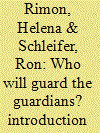

|
|
|
|
|
| Publication |
2013.
|
| Summary/Abstract |
The present special issue aims to raise questions about intellectuals, those members of society who are typically expected to engage in fruitful questioning of social mores.
A key contribution of 18th-century Enlightenment thought to modern culture was the special status associated with a university degree. The mode of thinking which corresponds to this development is still prevalent today. A university alumna holding a degree in the humanities-and, historically beginning at a somewhat later date, also one holding a degree in the social sciences-automatically achieves the halo of a gatekeeper in our society. Yet at the same time, in our era, political violence also draws considerable support from influential intellectuals. Intellectuals in the last three centuries have in different ways expressed their support for political violence, even identifying with it ideologically and emotionally. Intellectuals have even provided the perpetrators of violence with a legitimacy of sorts at different junctures, while the perpetrators of violence themselves have in turn cited humanistic values to advance their perverted worldviews and to obtain a grounding for them.
|
|
|
|
|
|
|
|
|
|
|
|
|
|
|
|
|
|
|
|
|